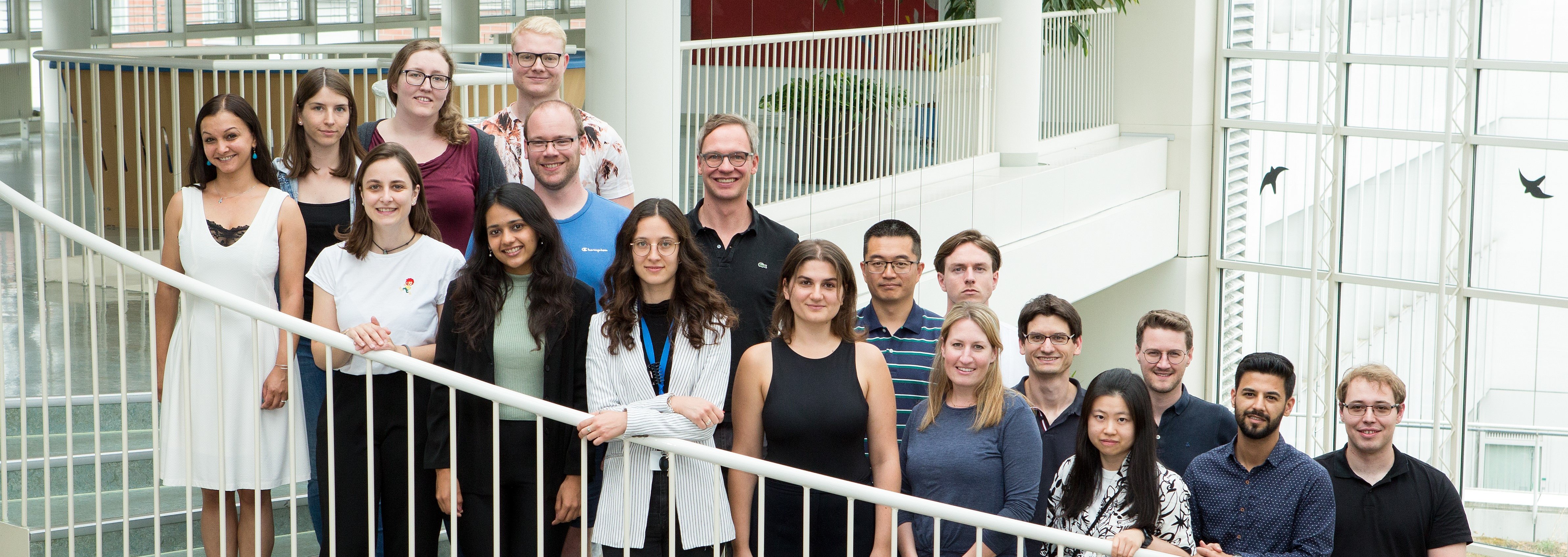Arbeitsgruppe Prof. Dr. H. Poeck
Gezielte Immunmodulation in Krebs
Inspiriert von seiner klinischen Arbeit, die sich in auf myeloische Neoplasien, allogene Stammzelltransplantation (allo-SZT) und zelluläre Therapien mit genetisch modifizierten T Zellen (CAR T-Zellen) konzentriert, beschäftigt sich Prof. Poecks wissenschaftliche Arbeitsgruppe mit der Erforschung von Anti-Tumor-Antworten, der Auslösung von Resistenzmechanismen sowie der Geweberegeneration bei der Behandlung von Krebspatienten mittels Immuntherapien einschl. allo-SZT und zellulären Therapien.
Im Speziellen möchten wir dabei ermitteln, welche Bedeutung (i) spezifische Signalwege des angeborenen Immunsystems und seine Modulation via Genommodifikation, (ii) die verschiedenen Komponenten des Stuhl- und Gewebemikrobioms einschl. der Rolle von Ernährung / Diät und (iii) vom Tumor-abstammende Faktoren (z.B. tumor-abstammende extrazelluläre Vesikel (EVs)) hinsichtlich Therapieerfolg und Resistenzentstehung sowie für die Geweberegeneration im Kontext o.g. Immuntherapien besitzen. Seine Forschungsarbeit vereint dadurch die hochrelevanten Bereiche Mikrobiom, Ernährung, Stammzelltransplantation und zelluläre Therapien einschl. Cell engineering und Nukleinsäure-basierte Therapeutika.
Dabei verfolgen wir sowohl einen „forward und reversen Translationsansatz“ bei denen interessante Ergebnisse aus der Maus oder aus dem Patienten (z.B. Identifikation bestimmter mikrobieller Metabolite/Signaturen bei CAR-T und allogen stammzelltransplantierten Patienten die mit einem verbesserten Ansprechen verbunden sind) in hochwertige präklinische Modelle (z.B. Patient-derived Organoid-Ko-Kultur-Modelle, Xenograft- und immunkompetente Mausmodelle) überführt werden, um die Wirksamkeit und die molekularen Mechanismen der neuen Kombinationen in Modellen mit klinischer Relevanz genauer zu erforschen. Ultimatives Ziel ist dann die Umsetzung in eine frühe klinische Studie (Investigator Initiated Clinical Trials (IITs)).
Bei weiterhin großen inter-individuellen Unterschieden im Therapieansprechen ist es das Ziel unserer Forschungsarbeit, obige Information für die Entwicklung neuer, gezielter Kombinationstherapien zur Verbesserung der Ansprechraten dieser Immuntherapien zu nutzen. Gleichzeitig sollen neue Biomarker für die Vorhersage klinischer Ergebnisse identifiziert und unerwünschte Immunvermittelte Nebenwirkungen wie die Spender gegen Empfängerreaktion (engl. graft-versus-host disease (GvHD) oder das Cytokine Release Syndrome (CRS) bzw. Immuneffektorzell-assoziierte Neurotoxizitätssyndrom (ICANS) nach CAR T Therapie minimiert werden. Um dieses Ziel zu erreichen wurden eine Reihe von lokalen, nationalen und internationalen Kooperationen etabliert.
Hashtags, die das Umfeld der Gruppe beschreiben:
International, freundlich, aufgeschlossen, motiviert, kreativ, fleißig, sozial
Wissenschaftliche Schlüsselwörter, die die Gruppe und ihre Forschung beschreiben: Nucleic-Acid Therapeutics, microbiome, metabolites, nutrition, CAR T cells, allogeneic hematopoietic stem cell transplantation, cellular engineering







 Blut spenden
Blut spenden
 Anreise
Anreise
 Veranstaltungen
Veranstaltungen
 Kontakt
Kontakt
 Presse
Presse










